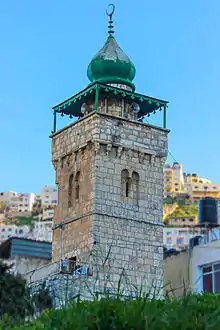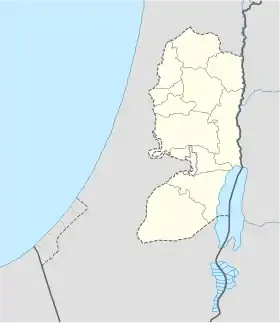| Al-Khadra Mosque | |
|---|---|
مسجد الخضرة | |
 | |
| Religion | |
| Affiliation | Islam |
| Branch/tradition | Sunni |
| Location | |
| Location | Nablus, West Bank, Palestine |
 Shown within the West Bank | |
| Geographic coordinates | 32°12′44.48″N 35°16′15.20″E / 32.2123556°N 35.2708889°E |
| Architecture | |
| Type | mosque |
| Style | Mamluk |
| Groundbreaking | 1288 |
| Completed | 1290 |
| Specifications | |
| Length | 18.6 meters (61 ft) |
| Width | 7.2 meters (24 ft) |
| Minaret(s) | 1 |
| Minaret height | 30 meters (98 ft) |
Al-Khadra Mosque (Arabic: مسجد الخضرة, romanized: Masjid al-Khadra, lit. 'the Green Mosque') also known as Hizn Sidna Yaq'ub Mosque (trans. Sadness of our Lord Jacob), is a mosque situated on the lower slopes of Mount Gerizim in the southwestern quarter of the Old City of Nablus in the West Bank. The mosque is rectangular in shape, and its minaret rises 30 meters (98 ft).[1]
History

According to local Muslim tradition, the mosque is situated upon the site where Jacob wept after being shown Joseph's blood-soaked tunic which suggested that he had been mauled and killed; on the right of the courtyard is a small room said to be the place where Jacob sat down and wept.[2] Hence the mosque's alternative name "Sadness of our Lord Jacob".[3]
According to Samaritan tradition, al-Khadra Mosque had been a synagogue destroyed by the Crusaders. They claim that its Arabic name al-Khadra ("the Green") derived from the Samaritan Mahallat Khadra ("the place of the Green").[4] Archaeologist Michael Avi-Yonah identified the Khadra Mosque with the synagogue built by the Samaritan high priest Akbon in 362 CE.[5]
The synagogue was rebuilt in 1137 by Ab Giluga, a Samaritan from Acre. Several Western scholars, however, believe, because of examples of Gothic architecture in portions of the present-day mosque, that in the 1170s, there stood a Crusader church and bell tower.[4] Arab geographer Yaqut al-Hamawi records in 1225, while Nablus was under Ayyubid rule, the buildings was restored to become a Samaritan synagogue, which he referred to as "a large mosque" which the Samaritans venerated.[6] It is probably from this era that the Samaritan inscriptions on a minaret wall were made.[7]
In 1242, however, the Knights Templars damaged the building, which was later destroyed in 1260 by the Mongols.[8] It was transformed as a mosque in 1290 by the Mamluks during the reign of Sultan Qalawun as attested to by a foundation inscription.[9] Most of the structure resembles Mamluk architecture and a mihrab was added to the mosque.[1]
Second Intifada
According to the Palestinian government and Gush Shalom, during the Second Intifada in the Battle of Nablus in 2002, Israeli bulldozers destroyed 85% of the mosque, including the Mamluk-era mihrab.[10][11][12] The current imam of al-Khadra Mosque, Maher Kharaz (the 'White Lion'), was removed from his position in a Palestinian Authority 'crack down' on militant imams in 1996, but was reinstated in 2006.[13][14] Kharaz, a Hamas member and opponent of Fatah, regularly defied the Fatah-led Palestinian National Authority during his weekly Friday sermons.[15] Kharaz was arrested on September 23, 2007 in another Fatah-led 'crack down' on Hamas.[16][17][18]
References
- 1 2 Pringle, 1993, pp.112.
- ↑ Feyerick (1996) p 148
- ↑ Luke, 1922, p.102.
- 1 2 Pringle, 1993, p.111
- ↑ Avi-Yonah, Michael. Discussion: Mount Ephraim and Benjamin, 35. Neapolis - (Nablus) Archived 2016-10-12 at the Wayback Machine Studium Biblicum Franciscum - Jerusalem. 2000-12-19.
- ↑ al-Hamawi quoted in le Strange, 1890, p. 512
- ↑ Herbermann, 1913, p.417
- ↑ Pringle, 1993, pp.112-113.
- ↑ Dumper, Stanley and Abu-Lughod (2007) p 266
- ↑ Report on the Destruction to Palestinian Institutions in Nablus and Other Cities (Except Ramallah) Caused by IDF Forces Between March 29 and April 21, 2002 Archived October 21, 2008, at the Wayback Machine Gush Shalom. 2002-04-22.
- ↑ Destruction of Nablus Old City, a war crime, Palestinian minister Archived 2012-02-14 at the Wayback Machine Arabic News. 2002-08-13.
- ↑ Gresh (2004) p 171
- ↑ Ha'aretz 30 June 2007 Hamas preacher defies PA gov't ban on incitement in mosques By The Associated Press
- ↑ Jpost 23 September 2007 Palestinian forces arrest prominent Hamas preacher
- ↑ Hamas preacher defies government order to stop talking politics in mosques International Herald Tribune and Associated Press. 2007-06-28.
- ↑ Seattle Times 1 November 2007 Abbas takes textbook approach to security By Karin Laub The Associated Press
- ↑ Guardian 2 November 2007 Fatah targets mosques in latest anti-Hamas campaign
- ↑ UN Doc Archived 2008-02-06 at the Wayback Machine Chronological Review of Events Relating to the Question of Palestine, Monthly media monitoring review September 2007
Further reading
- Dumper, Michael (2007). Cities of the Middle East and North Africa: A Historical Encyclopedia. ABC-CLIO. ISBN 978-1-57607-919-5.
- Feyerick, Ada (1996). Genesis: World of Myths and Patriarchs. NYU Press. ISBN 0-8147-2668-2.
- Gresh, A. (2004). The New A-Z of the Middle East: Second Edition. I.B.Tauris. ISBN 1-86064-326-4.
- Herbermann, G. (1913). The Catholic Encyclopedia: An International Work of Reference on the Constitution, Doctrine, and History of the Catholic Church. Encyclopedia press, inc.
- Le Strange, Guy (1890). Palestine Under the Moslems: A Description of Syria and the Holy Land from A.D. 650 to 1500. London: Committee of the Palestine Exploration Fund. OCLC 1004386.
- Luke, H. (1922). The Handbook of Palestine. Macmillan and Co. p. 102.
Khadra Mosque Nablus.
- Pringle, D. (1993). The Churches of the Crusader Kingdom of Jerusalem: A Corpus. Cambridge University Press. ISBN 0-521-39037-0.
.jpg.webp)